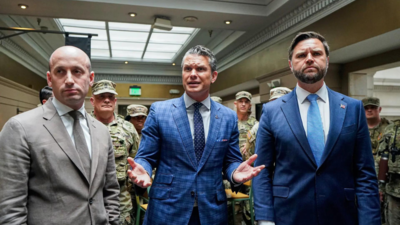Pentagon Deploys 600 Military Lawyers as Immigration Judges
The Pentagon is preparing to deploy up to 600 military attorneys to serve as temporary immigration judges in response to a massive backlog of immigration cases.

The Defense Department is poised to authorize up to 600 military attorneys to act as temporary immigration judges, a move confirmed by Pentagon officials after a request from the Justice Department. This unprecedented deployment aims to address the staggering backlog in U.S. immigration courts, which now exceeds 3.4 million cases. The Pentagon's involvement follows recent firings of more than two dozen immigration judges nationwide, intensifying concerns about judicial capacity and case delays.
Background and Policy Changes
Chief Pentagon spokesman Sean Parnell stated that the department is currently identifying qualified Judge Advocates and civilian attorneys for these temporary assignments. The Trump administration recently relaxed job requirements for temporary immigration judges, broadening eligibility to include government lawyers with less immigration law experience. Previously, such roles were restricted to Justice Department attorneys with a decade of immigration law expertise or former immigration judges. The new rule, published in the Federal Register, reflects the administration's view that a wider pool of lawyers can serve the interests of the Executive Office for Immigration Review.
Legal and Ethical Concerns
The American Immigration Lawyers Association (AILA) issued a strongly worded statement criticizing the plan, arguing that military lawyers—even those well-versed in military legal matters—lack the specialized training and experience required for complex immigration law. "It makes as much sense as having a cardiologist do a hip replacement," AILA noted, expressing concerns that due process and the integrity of the immigration judiciary are at risk. The association called on Congress to intervene and safeguard the independence of the immigration courts.
State-Level Initiatives and Precedents
In Florida, Republican Governor Ron DeSantis has proposed loaning National Guard Judge Advocate General Corps officers to serve as immigration judges, an idea described by legal experts as unprecedented. Under his plan, Florida would transfer command of these officers to federal authorities, allowing them to be appointed as immigration judges by the U.S. attorney general. Typically, National Guard troops deployed for disaster relief or security remain under state command, but this proposal would shift their authority to Washington under Title 10 of the U.S. Code.
Implications for the Immigration System
The deployment of military lawyers as immigration judges represents a significant shift in how the federal government manages immigration adjudication. Critics warn that the move could undermine fair hearings and erode public trust in the immigration court system, while supporters argue it is a necessary response to the overwhelming backlog. The long-term impact on case outcomes and judicial independence remains uncertain, with advocacy groups and legal experts calling for increased oversight and transparency.